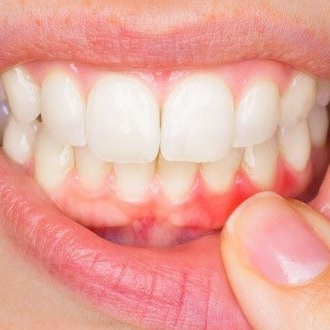Gingivitis (Gingivitis in gums) is a common and mild gum disease (periodontal disease) that causes irritation, redness, swelling, and inflammation in a part of the gums, especially around the base of the teeth, and may be accompanied by gum bleeding during brushing. Since gingivitis can lead to a gum disease called periodontitis and tooth loss, it should be taken seriously.
The most common cause of gingivitis is poor oral hygiene. Good oral hygiene habits, including brushing at least twice a day, daily flossing, using mouthwash, and regular dental checkups, help prevent gingivitis. Gingivitis can be easily treated at home. The home remedies described are generally safe, but if you are pregnant or breastfeeding, it is recommended to consult your specialist doctor.
How to Prevent Gingivitis?
Since maintaining oral hygiene is crucial for preventing gingivitis and other dental problems, before discussing home remedies, we should ensure proper oral care practices are being followed.
- Brush your teeth at least twice a day, or if possible, after every meal.
- Use an electric toothbrush for better cleaning.
- Use a soft or very soft toothbrush and replace it every three months.
- Use dental floss and natural mouthwash.
- Visit the dentist at least once a year.
- Avoid smoking or chewing tobacco.
- Limit sugar intake.
How to Treat Gingivitis at Home?
Saltwater for Gingivitis
Salt is a natural disinfectant, and using saltwater can be very helpful in improving inflamed gums. Saltwater reduces gum pain, removes food particles from the mouth, and eliminates bacteria to help fight bad breath. The best salt solution is 1/2 to 3/4 teaspoon of salt in a glass of lukewarm water. Use this solution two to three times a day for 30 seconds each time. Excessive or prolonged use may negatively impact tooth enamel and lead to erosion.
Mouthwash for Treating Gingivitis
If saltwater is not effective in reducing inflammation, homemade mouthwashes can be used.
1- Lemon Balm Mouthwash
Dilute two to three drops of lemon balm oil in a cup of water and swish the solution in your mouth for up to 30 seconds. You can do this two to three times a day. Studies show that this mouthwash is more effective than chlorhexidine in reducing plaque and gingivitis, but it should be used very diluted initially to avoid irritation.
2- Aloe Vera Mouthwash
This mouthwash is as effective as chlorhexidine in reducing plaque and gingivitis. Aloe vera water does not need to be diluted and should be used with 100% purity. Use this solution two to three times a day for 30 seconds each time. However, if you are allergic to aloe vera, avoid using this mouthwash.
3- Tea Tree Oil Mouthwash
Add about three drops of tea tree oil to a cup of warm water and swish the solution in your mouth for up to 30 seconds. Alternatively, you can add a drop of this oil to your toothpaste while brushing. Initially, use a very diluted solution as high concentrations may cause allergic reactions, mild burns, or scratches on the gums.
4- Sage Mouthwash
Sage mouthwash significantly reduces the bacteria that cause dental plaque. To use this mouthwash, boil one to two cups of water and add two teaspoons of fresh sage or one teaspoon of dried sage. Let it steep for 5 to 10 minutes. After straining and cooling the solution, rinse your mouth with it two to three times a day. Sage has antibacterial and anti-inflammatory properties that help reduce gum swelling and treat infection.
Coconut Oil
Coconut oil contains lauric acid and has anti-inflammatory and antimicrobial properties, which reduce plaque and symptoms of gingivitis. Swish one to two teaspoons of coconut oil in your mouth for 20 to 30 minutes. Then spit out the oil, rinse your mouth with water, drink a glass of water, and brush your teeth.
If the duration of holding oil in your mouth feels too long, you can do this for shorter periods more frequently throughout the day. Ensure the oil does not touch the back of your throat, as it may contain toxins and bacteria from the mouth.
Clove
Clove has antiviral and antioxidant properties that help reduce gingivitis and soothe pain. Crush about one teaspoon of clove and gently apply a moist cotton ball soaked in clove onto your gums. Do this for one minute, then rinse your mouth with water.
Turmeric Gel or Curcumin
Turmeric’s anti-inflammatory properties effectively reduce gingivitis. Additionally, its antimicrobial and antifungal properties help treat gum bleeding and redness. Turmeric gel, available under the name "Curcumin" or its active ingredient, can be found in pharmacies. Use this gel up to twice a day for 10 minutes each time on the gums.
Sources:
healthline.com, medicalnewstoday.com












Our Customers' Comments
No comments registered